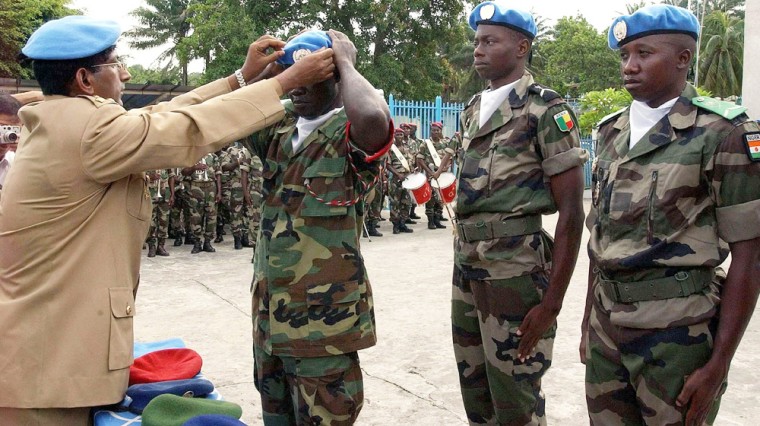Facing a chronic shortage of foreign troops for peacekeeping missions, President Bush has decided to launch an international drive to boost the supply of available forces — a move that if successful could relieve some of the pressure on U.S. soldiers to join such operations, defense officials said.
A plan approved by Bush earlier this month calls for the United States to commit about $660 million over the next five years to train, equip and provide logistical support to forces in nations willing to participate in peace operations.
The campaign, known as the Global Peace Operations Initiative, will be aimed largely at Africa by expanding the peacekeeping skills of African forces and encouraging international military exercises in the region, where U.S. officials said much of the need exists.
But African forces developed under the program could be used in peace operations anywhere in the world, officials said. And the program also sets aside some assistance for armies in Asia, Latin America and Europe to enlarge their peacekeeping roles as well.
Pentagon officials who briefed The Washington Post stressed that the plan, which Bush has yet to formally announce, is not meant as a unilateral U.S. effort. They said Bush intends it to be a broad, multinational push, with other countries contributing trainers and additional resources, although consultations with potential partner nations remain at an early stage.
The initiative grows out of the frequent struggle by administration officials to recruit enough foreign forces for peacekeeping missions. In Haiti, the latest case, the administration hopes a force of 6,000 to 7,000 international troops can be cobbled together under a U.N. mandate to replace an interim contingent of about 3,800 led by the United States and including French, Canadian and Chilean soldiers.
Many of the world's peacekeeping missions operate under the auspices of the United Nations, which currently oversees more than 50,000 troops in 14 places. That troop number is due to grow by about 20,000 as four other planned operations take shape in Haiti, Burundi, Sudan and Cyprus.
'Not enough capacity in the world'
But efforts to meet this surge have been handicapped by the demands of U.S. and NATO-led coalitions trying to stabilize Iraq, Afghanistan and the Balkans. These operations have sapped troops and resources from the United States, Canada and some European countries — traditional sources of support for U.N. peacekeeping missions.
"There is not enough capacity in the world to deal with the requirements," said Douglas J. Feith, the Pentagon's undersecretary for policy. "Other countries have shown an interest in building up their peacekeeping forces, but they need help."
The goal of Bush's initiative is to train about 75,000 additional foreign troops who could be deployed on short notice and perform a wide range of peacekeeping activities, including the most dangerous and demanding ones.
"This is meant to expand worldwide capacity that could be used by the United Nations or by others," Feith said.
By focusing on Africa, Bush is building on a State Department program that has provided training assistance to the region since the mid-1990s. But funding for that effort — the African Contingency Operations Training and Assistance program — has stayed below $15 million in recent years.
Another program, known as Enhanced International Peacekeeping Capacities and used to fund U.S. training for peace operations worldwide, has received even less money.
Administration officials expect to finance Bush's initiative from Pentagon as well as State Department accounts. Some of the trainers will come from U.S. military ranks, but in certain regions, private contractors are more likely to be used, according to Joseph Collins, the Pentagon's deputy assistant for stability operations.
Months in the making
Although past U.S. training efforts have succeeded in creating some additional peacekeeping capacity, one of the persistent challenges has been sustaining units that have received the training.
"They have tended to dissipate as a result of people leaving, dying, getting reassigned," Feith said. "So there's a major element in the president's initiative that deals with sustainment, which is to say, continual training and incentives to keep these units together so they can be used."
On Capitol Hill, a Democratic staff member with a Senate committee — one of the few in Congress who has been briefed on the initiative — predicted it will receive broad bipartisan support. Several independent analysts also welcomed the initiative.
"This is an awakening for an administration that hadn't made peacekeeping a priority," said Victoria Holt, a senior associate at the Henry L. Stimson Center, a Washington research group. "They are recognizing that if they want to have other countries participate in peacekeeping, they must provide more support."
Bush's plan has been months in the making, according to officials involved in drafting it. As early as November 2002, in a speech in Chile to a gathering of defense ministers from countries in the Western Hemisphere, Defense Secretary Donald H. Rumsfeld briefly mentioned the need to do something to increase the number of peacekeeping forces available around the world.
The president's initiative stops short of establishing standing military units that would be devoted only to international peacekeeping — an idea that U.S. officials considered but discarded as unnecessarily restrictive.
It also makes no provision for creating forces within the U.S. military that would be reserved for peacekeeping missions. This notion has gained favor with some in the Pentagon, including Arthur Cebrowski, director of the Office of Force Transformation. But it faces stiff opposition from senior Army officials who argue that combat troops can be used for peacekeeping when required and that designating a separate peacekeeping-only force would sap overall U.S. military strength.
"We are always going to do our share of peacekeeping," Collins said. "What we want to avoid is doing more than we have to."
